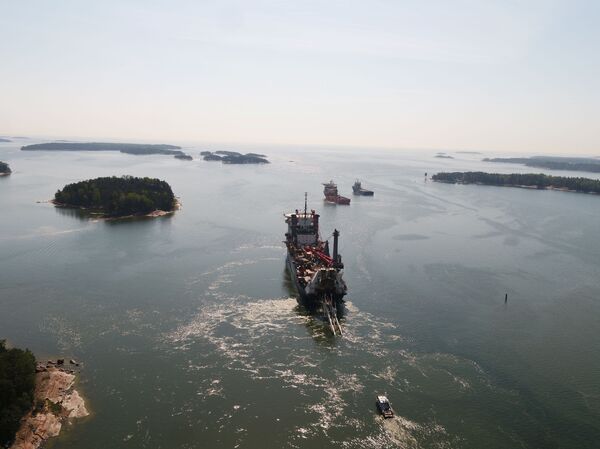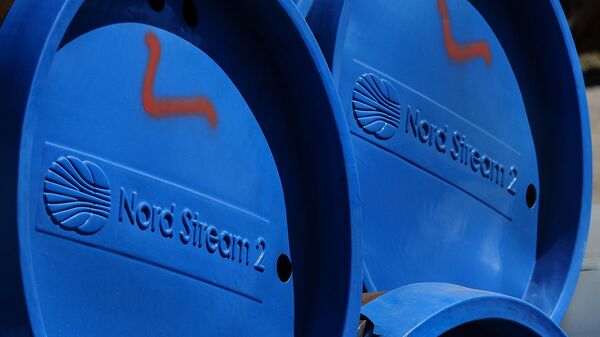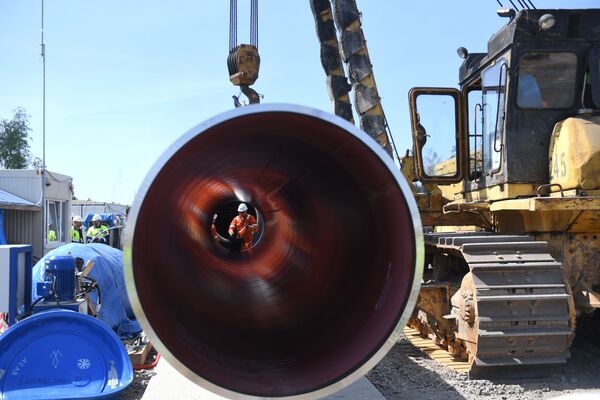Germany had reportedly offered to invest up to 1 billion euros ($1.2 billion) in terminals for liquefied natural gas (LNG) from the United States as a way of saving the Nord Stream 2 pipeline project, targeted by Washington’s sanctions, according to sources cited by Die Zeit newspaper.
The non-official proposal is suggested as having been sent by the German Finance Ministry on 7 August, before Washington imposed sanctions on companies involved in the project.
In a letter to Treasury Secretary Steven Mnuchin, cited by Die Zeit, German Finance Minister Olaf Scholz reportedly vowed to earmark close to 1 billion euros in funding for the construction of LNG terminals if Washington agreed to abandon sanctions targeting firms involved in Nord Stream 2. The LNG terminals in question were to be built at two locations on the North Sea coast.
"In return, the United States will allow the construction and operation of Nord Stream 2 to proceed unhindered. The US will not exercise its legal scope for sanctions," Die Zeit quoted the letter as saying.
Other proposals included in the cited paper allegedly pertained to a gas transit contract for Ukraine and the financing of an alternative pipeline and a terminal that would allow Poland to use the US LNG.
A spokesman for the German Finance Ministry did not offer an official comment on the report.
Challenge-Riddled Mega-Project
The Nord Stream 2 mega-project, worth $10.5 billion, is a joint venture funded by Russia’s Gazprom and five EU energy giants, Uniper, Wintershall, OMV, Engie, and Royal Dutch Shell, that will ultimately be capable of pumping around 55 billion cubic metres of gas annually from Russia to Germany and the rest of Europe.
Despite long being defended by its participants as a purely economic venture rather than a political one, the 1,230 km pipeline project has been forced to tackle a plethora of challenges, ranging from negotiating operating terms and obtaining clearances from the involved countries, to US sanctions, imposed in December 2019 against a key contractor, Switzerland-based AllSeas.

The sanctions outlined in the 2020 National Defence Authorisation Act (NDAA) came as the Nord Stream 2 project had just 160 km left to build.
Washington has long claimed that the Nord Stream 2 project would leave Ukraine without money from Russian gas transit, while making Europe dependent on Russian gas. The EU and Russia have denied these allegations, insisting that the project is purely an economic one.
The US has also been driven by ambitions to sell Germany and Eastern Europe its more expensive, tanker-delivered liquefied natural gas.
The pipeline envisions doubling the existing 55 billion cubic meters of gas per year capacity of the Nord Stream network once completed, and is set to make Germany a major energy hub.
Only recently, the project has been forced to deal with another threat to its existence, amid suggested sanctions against the joint venture after German authorities accused Moscow of being the culprit in the purported poisoning of political activist Alexei Navalny.
German Chancellor Angela Merkel has reportedly told officials that “a final decision has not been taken” on the future of the Nord Stream 2 pipeline, as Washington has pressured Berlin to cancel the project, with Warsaw actively supporting the stance.
Polish government spokesman Piotr Muller fed into the speculations surrounding the future of Nord Stream 2, asserting that Poland was ready to offer Germany access to its Baltic Pipe gas pipeline project instead.
Baltic Pipe is a proposed 800-950 km natural gas pipeline between Poland and oil-rich Norwegian waters in the North Sea which is not yet under construction that Warsaw hopes to see completed by October 2022.
Since last week’s announcement that the Navalny case would be treated as an “attempted murder by poisoning”, the German government has faced pressure to scrap the Nord Stream 2 project, with some German lawmakers and several of Berlin’s foreign allies suggesting abandoning the nearly finished pipeline to ‘punish’ Russia, despite no proof having been provided to substantiate the allegations.



